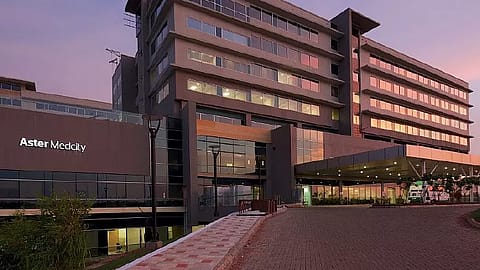India, GCC business split to unlock regional growth: Aster DM
To ramp up Indian hospital bed capacity with 1,500 new beds by FY27.

Aster DM Healthcare's decision to split its Indian and Middle East (GCC) businesses into two separate entities and bring in an equity investor in the GCC business is to unlock value in both geographies and to reward existing shareholders, says chairman Azad Moopen.
Under the separation plan, a consortium led by Fajr Capital, a sovereign-owned private equity firm headquartered in the U.A.E., will acquire a 65% stake in the ownership of the GCC business under Aster DM Healthcare FZC. The Moopen family will continue to manage and operate the GCC business retaining a 35% stake. While Moopen will continue as chairman of both entities, his daughter Alisha Moopen will become managing director and Group CEO of the GCC business. The transaction values the GCC business at an enterprise value of $1.7 billion (₹13,540 crore), and an equity value of $1 billion (₹8,215 crore).
"In the last few years, the GCC business has stagnated, mainly due to health insurance becoming mandatory and our customers becoming insurance companies instead of patients. It was affecting the margins and capital for growth, while the Indian business was growing at over 20%," Moopen tells Fortune India in an exclusive interaction. Aster DM Healthcare, started by Dr Azad Moopen in 1987 as a single clinic in Dubai, now has 15 hospitals, 118 clinics and 276 pharmacies across the U.A.E., Saudi Arabia, Qatar, Oman, Bahrain and Jordan. In India, Aster has 19 hospitals, 13 clinics, 226 pharmacies and 251 patient experience centres, mainly in South India. In FY23, Aster had revenues of ₹11,933 crore, of which ₹8,950 crore was from the GCC market.
GCC and Indian healthcare markets have different growth dynamics and require different business strategies, says Moopen. The focus of Aster in GCC will be mainly on the U.A.E. market and the emerging Saudi Arabia, which has big potential with a huge population. In India, Aster will be looking to follow a hub and spoke model, mainly in its established markets like Kerala, Karnataka, Andhra Pradesh etc. The company plans to ramp up bed capacity in India by almost one-third, by adding more than 1,500 beds by FY27. Efforts in India will be to improve margins with better operational costs, supply chain management and digitisation. The Indian entity will continue to be led by Nitish Shetty as chief executive officer.
The management had increased the promoter stake to 42% earlier this year. "Major institutional shareholders continue to remain invested, reflecting overall confidence in our India business model and go-to-market strategy," he says.